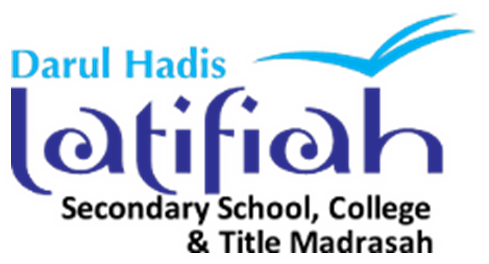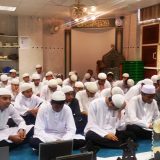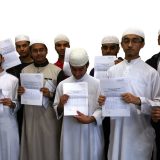
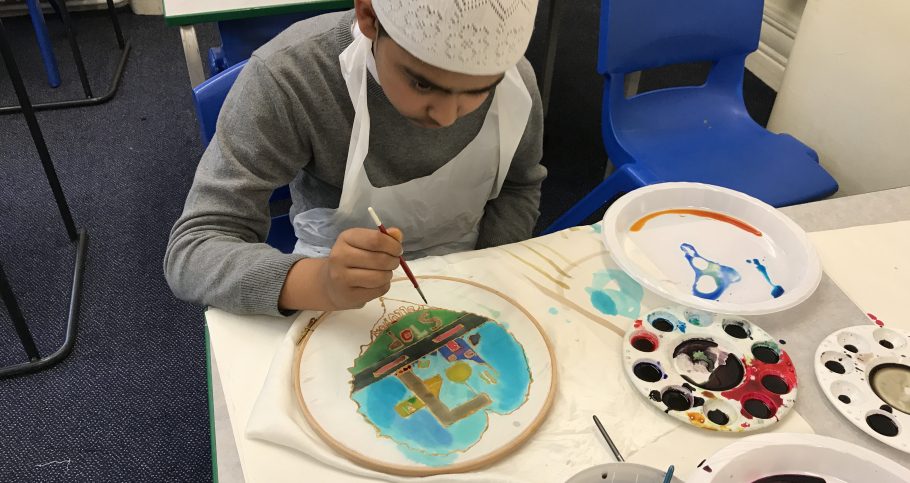
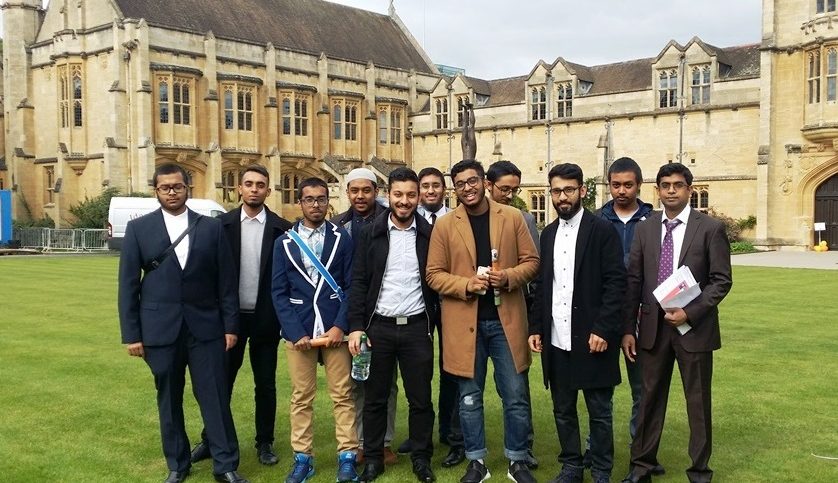
Darul Hadis Latifiah Curriculum Plan
Intent:
Darul Hadis Latifiah is an independent Islamic secondary school and sixth form in the heart of Bethnal Green, East London. It was opened with the intention of producing the next generations of British Muslim leaders. Towards this end, the school has developed, and is continually adapting, its curriculum in order to fulfil this ambitious goal.
Our curriculum has been designed with the intention of preparing our students for the world around them and to inculcate within them the skills which will enable them to continually learn and develop themselves throughout the rest of their lives.
The curriculum has been further designed to teach our students critical thinking skills, the ability to communicate confidently and clearly in all scenarios as well the ability to use their knowledge effectively in different situations.
Alongside this, our intention for our curriculum is to develop our students into model British citizens. We aim to inspire them to become respectful of all differences and tolerant to every person they meet. We aim for them to become the best students, sons, husbands, fathers and whatever other role they may play in life.
Our intention is also to develop our students to fit in seamlessly with the world around them. As such, we want our students to be aware of, amongst other things, their physical and mental health; to understand how British institutions work and how to manage their relationships with one another, as well as all future relationships.
Islamically, we aim to equip all our student with the understanding of the basic fundamentals of worship and morality so that they will be able to take ownership of their own faith practices and so that they may become a source of guidance for those who rely on them. At the same time, our intention is to facilitate their development into figureheads of the British Muslim community, successful in their professional fields as well as in their spirituality.
We are well aware that the vast majority of our students are from Black and Ethnic Minority backgrounds, with most being of Bangladeshi heritage. We are located in one of the most deprived boroughs in London and as such we realise that our students may not come from a background which is rich in cultural capital. Thus, our curriculum has been designed to enable our students to be exposed to these experiences so that they can flourish and achieve to the best of their potential.
For further details of our curriculum, including how we plan to implement our intent and how we will measure impact, please read our Curriculum Plan which can be found on the School Policies page.
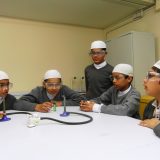
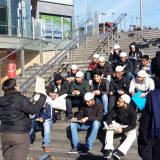
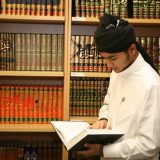
Library
The school has an extensive collection of fiction and non-fiction books, including classics and bestsellers as well as a large collection of research materials.
Maths
The Mathematics Department aims to develop the pupils’ ability to understand Mathematics and to study all aspects required by the National Curriculum.
Contents:
The end of Key Stage 3 (Year 9) Pupils will:
Pupils are expected to have reached Attainment Level 8 of the National Curriculum.
Key Stage 4 (Years 10 – 11) pupils will:
Pupils will continue to progress through the course, concentrating on the GCSE examination.
Science (Core; Double and Triple)
The primary aim of the Science Department is to provide a broad basis of scientific knowledge for all pupils. Furthermore we provide a more specialised science course specifically for those who wish to continue their studies in Further Education or pursue careers in Science, such as Pharmacy, Dentistry, Medicine and Engineering. Science is all about curiosity, healthy scepticism and a critical evaluation of their experiments in our well-equipped laboratory to attain scientific knowledge and develop practical skills in a safe and secure environment.
Contents:
Key Stage 3 (Years 7 – 9) pupils will:
Follow a foundation course during which they acquire scientific knowledge and develop practical skills in a safe secure environment.
Key Stage 4 (Years 10 – 11) pupils will:
Follow a GCSE Double Award Course (2 GCSEs in Science) covering aspects of Biology, Chemistry and Physics. Extra lessons are arranged for GCSE candidates and those needing extra support in their examination preparation.
English Language
English
The overall aim of the English programme is to provide a learning environment in which pupils can improve their skills in reading, writing, speaking and listening.
Contents:
At Key Stage 3 (Years 7 – 9) pupils will:
Follow a course which covers all aspects of the National Curriculum, including grammar, spelling, punctuation and vocabulary-building, all of which are taught in the context of real literacy and non-literacy discourses.
At Key Stage 4 (Years 10 – 11) pupils will:
Follow a dual certification course in English Language and Literature, leading to two separate GCSE examinations.
Information & Communication Technology (ICT)
In this modern age it is very important to be computer literate, and computer literacy is highly valued in the society. At the school we aim to provide the facilities to make our pupils competent users of information processors. Our commitment is coupled with the fact that we have the latest hardware, software and operating systems.
At Key Stage 3 (Years 7 – 9) pupils will:
Information & Communication Technology is taught according to the National Curriculum.
At Key Stage 4 (Years 10 – 11) pupils will:
In ICT they will be working towards gaining the European Computer Driving Licence (ECDL).
Religious Education
Religious Education
Geography
Geography
History
History
Citizenship
Citizenship
PE
PE
Arabic
Arabic
Bengali
Bengali
Qirat
Islamic studies has a central role to play in managing the personal, social, academic, religious and spiritual aspects of the pupils’ lives. It enhances pupil’s Islamic values and thereby helps them to put the Islamic way of life into practice as commanded by Allah Tala in The Holy Qur’an and indicated by the Prophet Muhammad’s (SAW) Sunnah.
Content:
At Key Stage 3 (Years 7 – 9) Pupils will learn:
- Islamic beliefs and practices through study of the Holy Qur’an and Hadis
- Life of Prophet Muhammad (SAW); other Noble Messengers (AS); and the Rightly Guided Khulafa
- Islamic Laws (Shariah) from The Holy Qur’an and the Hadis
- Basic Islamic Economics
- Recitation of the Holy Qur’an (Tajweed)
- Memorisation of the Holy Qur’an
At Key Stage 4 (Years 10 – 11) pupils will:
Continue to enhance their understanding, as well as revising in greater depth the subjects already covered at Key Stage 3. This will help them partially in their preparation for the GCSE examination in RE.
Tajweed
Islamic studies has a central role to play in managing the personal, social, academic, religious and spiritual aspects of the pupils’ lives. It enhances pupil’s Islamic values and thereby helps them to put the Islamic way of life into practice as commanded by Allah Tala in The Holy Qur’an and indicated by the Prophet Muhammad’s (SAW) Sunnah.
Content:
At Key Stage 3 (Years 7 – 9) Pupils will learn:
- Islamic beliefs and practices through study of the Holy Qur’an and Hadis
- Life of Prophet Muhammad (SAW); other Noble Messengers (AS); and the Rightly Guided Khulafa
- Islamic Laws (Shariah) from The Holy Qur’an and the Hadis
- Basic Islamic Economics
- Recitation of the Holy Qur’an (Tajweed)
- Memorisation of the Holy Qur’an
At Key Stage 4 (Years 10 – 11) pupils will:
Continue to enhance their understanding, as well as revising in greater depth the subjects already covered at Key Stage 3. This will help them partially in their preparation for the GCSE examination in RE.
Hadis Shareef
Islamic studies has a central role to play in managing the personal, social, academic, religious and spiritual aspects of the pupils’ lives. It enhances pupil’s Islamic values and thereby helps them to put the Islamic way of life into practice as commanded by Allah Tala in The Holy Qur’an and indicated by the Prophet Muhammad’s (SAW) Sunnah.
Content:
At Key Stage 3 (Years 7 – 9) Pupils will learn:
- Islamic beliefs and practices through study of the Holy Qur’an and Hadis
- Life of Prophet Muhammad (SAW); other Noble Messengers (AS); and the Rightly Guided Khulafa
- Islamic Laws (Shariah) from The Holy Qur’an and the Hadis
- Basic Islamic Economics
- Recitation of the Holy Qur’an (Tajweed)
- Memorisation of the Holy Qur’an
At Key Stage 4 (Years 10 – 11) pupils will:
Continue to enhance their understanding, as well as revising in greater depth the subjects already covered at Key Stage 3. This will help them partially in their preparation for the GCSE examination in RE.
Fiqh
Islamic studies has a central role to play in managing the personal, social, academic, religious and spiritual aspects of the pupils’ lives. It enhances pupil’s Islamic values and thereby helps them to put the Islamic way of life into practice as commanded by Allah Tala in The Holy Qur’an and indicated by the Prophet Muhammad’s (SAW) Sunnah.
Content:
At Key Stage 3 (Years 7 – 9) Pupils will learn:
- Islamic beliefs and practices through study of the Holy Qur’an and Hadis
- Life of Prophet Muhammad (SAW); other Noble Messengers (AS); and the Rightly Guided Khulafa
- Islamic Laws (Shariah) from The Holy Qur’an and the Hadis
- Basic Islamic Economics
- Recitation of the Holy Qur’an (Tajweed)
- Memorisation of the Holy Qur’an
At Key Stage 4 (Years 10 – 11) pupils will:
Continue to enhance their understanding, as well as revising in greater depth the subjects already covered at Key Stage 3. This will help them partially in their preparation for the GCSE examination in RE.
Islamic History
Islamic studies has a central role to play in managing the personal, social, academic, religious and spiritual aspects of the pupils’ lives. It enhances pupil’s Islamic values and thereby helps them to put the Islamic way of life into practice as commanded by Allah Tala in The Holy Qur’an and indicated by the Prophet Muhammad’s (SAW) Sunnah.
Content:
At Key Stage 3 (Years 7 – 9) Pupils will learn:
- Islamic beliefs and practices through study of the Holy Qur’an and Hadis
- Life of Prophet Muhammad (SAW); other Noble Messengers (AS); and the Rightly Guided Khulafa
- Islamic Laws (Shariah) from The Holy Qur’an and the Hadis
- Basic Islamic Economics
- Recitation of the Holy Qur’an (Tajweed)
- Memorisation of the Holy Qur’an
At Key Stage 4 (Years 10 – 11) pupils will:
Continue to enhance their understanding, as well as revising in greater depth the subjects already covered at Key Stage 3. This will help them partially in their preparation for the GCSE examination in RE.
Hifz
Islamic studies has a central role to play in managing the personal, social, academic, religious and spiritual aspects of the pupils’ lives. It enhances pupil’s Islamic values and thereby helps them to put the Islamic way of life into practice as commanded by Allah Tala in The Holy Qur’an and indicated by the Prophet Muhammad’s (SAW) Sunnah.
Content:
At Key Stage 3 (Years 7 – 9) Pupils will learn:
- Islamic beliefs and practices through study of the Holy Qur’an and Hadis
- Life of Prophet Muhammad (SAW); other Noble Messengers (AS); and the Rightly Guided Khulafa
- Islamic Laws (Shariah) from The Holy Qur’an and the Hadis
- Basic Islamic Economics
- Recitation of the Holy Qur’an (Tajweed)
- Memorisation of the Holy Qur’an
At Key Stage 4 (Years 10 – 11) pupils will:
Continue to enhance their understanding, as well as revising in greater depth the subjects already covered at Key Stage 3. This will help them partially in their preparation for the GCSE examination in RE.
